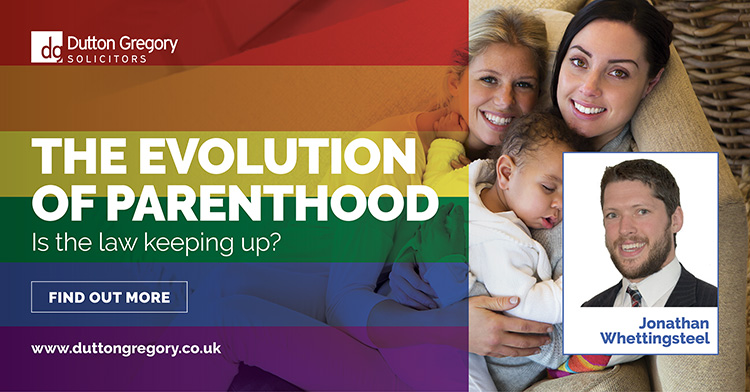We know that modern families come in all different shapes and sizes, but to mark Pride Month, Family Law Specialist, Jon Whettingsteel considers whether the law does enough to support and protect LGBTQ+ families.
When a child is born to a heterosexual couple, the mother automatically holds Parental Responsibility by virtue of carrying the children. According to Section 33 of the Human Fertilisation and Embryology Act 2008,
'The woman who is carrying or has carried a child as a result of the placing in her of an embryo or of sperm and eggs, and no other woman, is to be treated as the mother of the child'
In 2019 the definition of ‘mother’ was challenged in the High Court and considered by the President of the Family Division, Sir Andrew MacFarlane, when a transgender man, who gave birth to a child with the assistance of fertility treatment, applied to be registered as the child’s father.
The application was refused, with consideration being given to the above definition of a ‘mother’. The President stated that gender was not relevant when considering if a person was a child’s ‘mother’ or ‘father’. A ‘mother’ was defined as
‘The status afforded to a person who underwent the physical and biological process of carrying a pregnancy and giving birth.’
The Judgement went on to state that the current laws did not recognise the ‘social, or psychological’ reality of the relationship that the child would have with their parent, that in the child’s eyes this person would, indeed, be their father.
Over the Channel in France, the law has been changed to allow children to be registered with ‘parent 1’ and ‘parent 2’ as opposed to ‘mother’ and ‘father’, with school paperwork also being required to use the same wording.
Back in the UK, a Mother must be registered on a birth certificate by law, but there is no requirement for a father. For a heterosexual couple, a father would hold parental responsibility, along with the mother, if one of the following apply;
- The parties were married or in a civil partnership at the time of the birth;
- The parties marry or enter into a civil partnership after the birth of the child;
- The father is named on the child’s birth certificate as such;
- The parents enter into a Parental Responsibility Agreement;
- The father obtains a Parental Responsibility order;
- The court make a Child Arrangements Order for the child to ‘live with’ the father, including under a shared ‘live with’ order;
- The father is appointed as the child’s guardian upon the death of the mother;
For a same sex couple, if the parties are married or in a civil partnership then a second female parent automatically acquires Parental Responsibility. If undergoing artificial insemination the marriage or civil partnership must be in place at the time of insemination, not the point of the child’s birth. If not parties are not married or in a civil partnership, things might not be as straightforward.
An unmarried or non-civil partnered female partner can still obtain parental responsibility by entering into a Parental Responsibility Agreement, obtaining a ‘live with’ Child Arrangements Order, or being registered as the child’s guardian.
The other key point to note is that where a child is born through artificial insemination parental responsibility is only obtained by a second parent if this procedure is undertaken at a recognised and licenced medical centre. I have advised on an increasing number of situations where couples have found their own sperm donors online, set up private arrangements and then discovered, often with great shock, that non-biological parents have no Parental Responsibility for the child.
Without any automatic rights, permission from the Court is needed to seek a Child Arrangements Order and whilst this is rarely refused if parties are or were in a committed relationship, it is another obstacle that results in further costs and delays.
Where neither parent has a biological link to or has carried their child, but been assisted by a Surrogate, a Parental Order is needed to be legally recognised and obtain parental rights. I have written more on this subject here.
Since the introduction of Civil Partnerships in 2004, the law has made efforts to create equality between heterosexual and same-sex couples when it comes to marriage and civil partnerships and the division of matrimonial assets. However, when it comes to children and the recognition of a second parent there is still some catching up to do.
If you are thinking of starting or expanding a family, seek advice right from the start to ensure that you have all of the legal foundations in place because, should a relationship end for whatever reason, it will be difficult and costly to fix.








